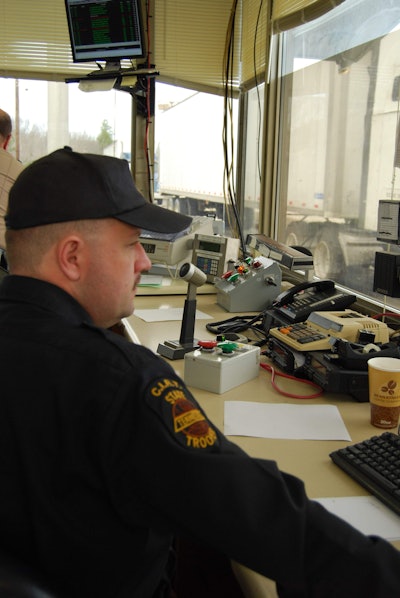
This one has to do with the so-called “interventions” FMCSA’s been conducting with carriers since the program went live last December. Anybody seen a warning letter, by chance? I’ve yet to hear from an independent or small fleet who has. But that doesn’t mean they’re not getting them. By the very nature of the percentile rankings that are the CSA “scores,” it’s certain that some carriers are above the intervention thresholds for one or another of the CSA Behavioral Analysis and Safety Improvement Categories (BASICs) and have received them.
Another question for those who have: Did you respond?
“You’re not required to respond to a warning letter,” Mark Catlin said yesterday, “but if you’re taking action [to address whatever problem the warning letter calls out], we’ve found it makes sense to outline those steps in a direct response.”
Catlin suggested such a response wouldn’t go unnoticed by the agency, and real improvement in your BASIC numbers as time goes by could well head off a more time-consuming, investigative intervention in the months ahead.

Among investigative interventions now being conducted are focused reviews both on- and off-site, Catlin noted. “Inspection personnel will request records be sent to them, but only on a focused BASIC. We’re really starting to see that the focused intervention is where the activity has been. It’s something of a next phase beyond the warning letter.” And it’s not just about FMCSA sniffing around for violations. Officials are “checking carriers’ safety management controls,” he added. “It’s not just about auditing documents now. What kind of policies and procedures do you have in place? Who’s responsible and accountable? It’s more than just record-keeping now. There’s a greater emphasis put on management controls to prove that you have a system in place… They want to see you’re taking specific steps to improve.”
If you’re not monitoring your CSA scores, start now. Find our comprehensive guide to the CSA program in our April and May issues, and check your rankings via the CSA website.
DeFazio hits cross-border program
I thought I’d share this letter to the FMCSA, as it rather sharply hits the nail on the head in terms of so many haulers’ and others’ concerns about the cross-border so-called “pilot program,” already beginning to ramp up on the Southern border.
It came from Peter DeFazio, Congressman from Oregon, and addresses inconsistencies in the FMCSA’s rush to open the border, most interesting among them being the plain English with which DeFazio says what many owner-operators have felt for a long time now, that the agency’s pilot programs are just a formality toward a predetermined goal — a fully open border. Noting the FMCSA has not, as required, reported to Congress about how they would address problems called out in the Inspector General’s report on cross-border pilot plans, DeFazio talks about the beginning of safety audits of Mexican carriers as validating what he calls a “longstanding concern” of his. To wit: “That the Administration is not launching a pilot program, but rather starting the full liberalization of cross-border trucking that will have significant impacts on safety, security, and American jobs.”
Here’s the letter in full:
The Honorable Anne S. Ferro
Administrator
Federal Motor Carrier Safety Administration
1200 New Jersey Ave, SE
Washington, DC 20590
Dear Administrator Ferro:
I am writing to express my concern over the Federal Motor Carrier Safety Administration’s (FMCSA) recent actions to move one step closer to allowing Mexican trucking companies to operate long-haul in the United States, in advance of fulfilling a statutory mandate to correct deficiencies in its proposed program and to report to Congress.
In 2007, in response to the previous Administration’s attempt to rush into an ill-advised trucking pilot program, Congress required the Office of Inspector General (IG) to audit FMCSA’s readiness to enforce compliance with U.S. safety rules and regulations before the agency could initiate any future pilot program (Section 6901, P.L. 110-28). The law requires FMCSA to take action to address any issues raised by the IG, and to report to Congress on the measures taken.
The IG completed its audit on August 19 and made the results available to the public on September 6, 2011. The report identified a number of areas that FMCSA must address. Specifically, the IG found that FMCSA did not yet have plans in place to: conduct on-site safety reviews in Mexico for at least half of participating carriers, as required by law; ensure that pilot program drivers and trucks are identified and inspected at each unique border crossing; verify driver and truck eligibility for the pilot program; acquire electronic monitoring devices for use in the pilot program; and train inspection and enforcement personnel at the border and within the United States.
To date, FMSCA has not sent a report to Congress or otherwise communicated plans to address the issues identified by the IG. Yet the agency is moving full speed ahead. On the same day the audit was made public, FMCSA published in the FMCSA Register the application of the first Mexican carrier to successfully complete a pre-authorization safety audit. This week, FMCSA published the name of another carrier. According to FMCSA’s regulations, listing a carrier in the FMCSA register is a “preliminary grant of operating authority” (49 CFR 365.507). I fail to see how the agency is authorized to grant authority prior to meeting all statutory requirements.
This further reinforces my longstanding concern that the Administration is not launching a pilot program, but rather starting the full liberalization of cross-border trucking that will have significant impacts on safety, security, and American jobs. Proceeding with the processing of Mexican carriers’ applications on a separate track from meeting any requirements the agency believes apply to the pilot program confirms that FMCSA intends for this pilot program to casually terminate and morph into an open border. This flies in the face of the limitation enacted by Congress.
I know you hold FMCSA’s mission to protect the safety of the traveling public in the highest regard. I hope you will agree that addressing the deficiencies identified by the Inspector General in a meaningful way is the only prudent course before Mexican trucks can be permitted to operate long-haul in the U.S.
Sincerely,
Peter A. DeFazio











